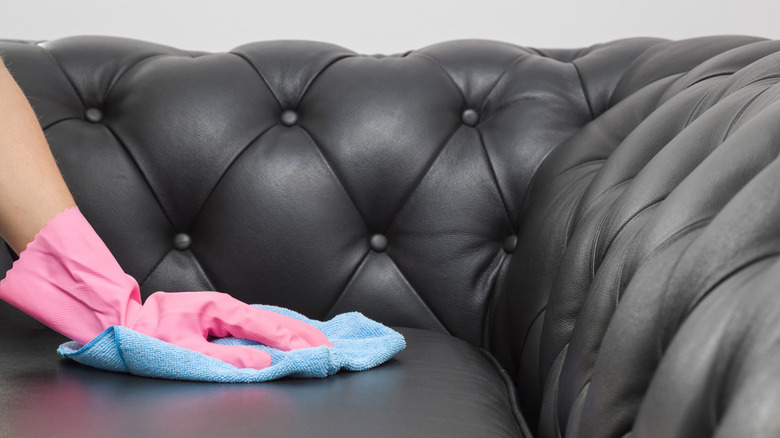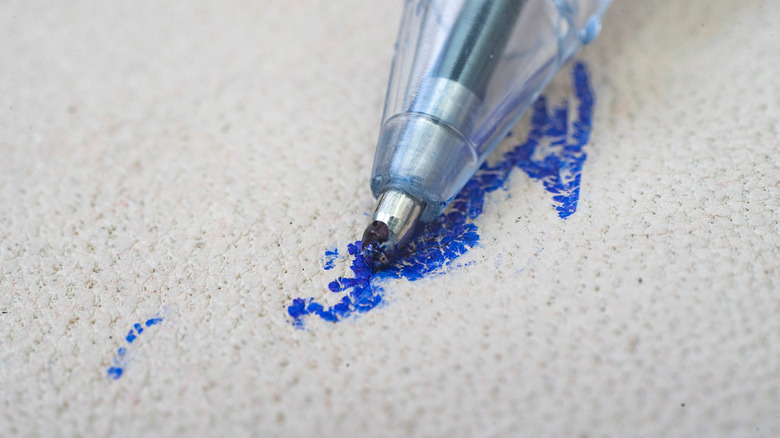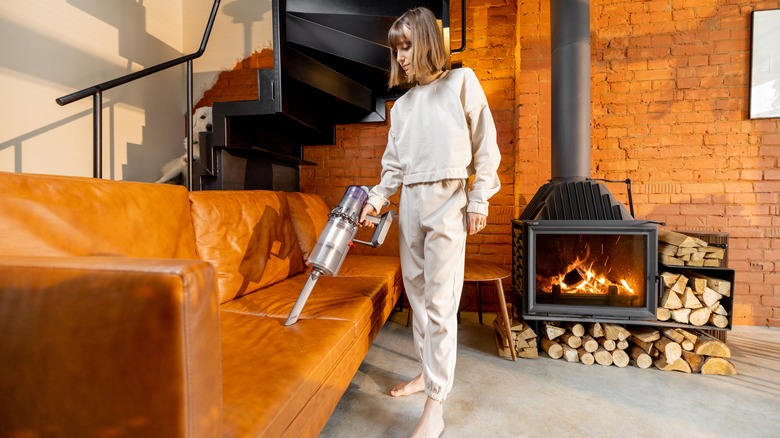A Damp Washcloth Isn't Ideal For Cleaning Leather Furniture - Here's Why
Anyone who's spent a pretty penny on a leather sofa or inherited a beloved, vintage leather chair from Grandpa knows these pieces aren't just furniture — they're legacy. The distinct feel and scent add a warm, inviting, and luxurious depth to any space. But, much like how an indoor plant fancies just the right amount of indirect sunlight, leather demands a unique brand of TLC. Reaching for that damp washcloth may seem like the no-brainer approach here, but it's an errant move that could leave sagas of stains and streaks on your furniture. Over time, water evaporates from the leather (but not without taking the natural oils with it), leading excellent leather towards a fate worse than a lousy upholstery job — aridness and brittleness that escalates into cracking.
As tempting as it may be to slather your couch with rich, moisturizing peanut butter or massage olive oil, kindly resist the temptation. In truth, household oils and high-fat foods (even household favorites like coconut oil and mayonnaise) can accelerate staining and cracking, much like the anti-aging cream that ages you instead. Yet, don't despair, as at your disposal are pH-balanced leather cleaners that respect the sanctity of your prized possession. These products gently remove dirt and grime while maintaining the moisture balance to keep your legacy piece as splendid as the day it first graced your living room.
Cleaning remedies that might damage leather furniture
While water is often viewed as an innocent bystander in life, the truth is it can lead to drama for your leather furniture. Unlike distilled water, tap water tends to have a flair for the extreme, with varying pH levels that can wreak havoc on your couch. Any high pH (alkaline) or low pH (acidic) situation can break your sofa's protective coating. And should you dare entertain the thought of using soapy water for cleaning, you might as well roll out the red carpet for damage and wear, as this solution is highly alkaline, with a pH of 12.
Natural oils like olive and neatsfoot oil can condition and enhance your throne of cowhide in the short term. But eventually, it all goes south. Time does strange things to oil, causing it to oxidize and betray the very material it once protected. The inevitable hardening effect leads to cracks. Vegetable oils aren't any better — they can leave your leather with a rotten and unpleasant texture, not to mention a funky odor. And heads up, baby oil shares the same devious characteristics.
Fatty spreads like peanut butter rarely go unmentioned in leather maintenance discussions. Whereas they may tickle our taste buds, their impact on leather furniture is anything but savory. Leave them to linger too long on your once-pristine couch, and stains, discoloration, and overall calamity may ensue, leaving behind the bitter taste of regret.
The best leather cleaners for furniture
By treating your leather sofa with the respect it deserves, you can expect a flawless lounging experience for years to come. So, how do you avoid transforming a cleaning session into an unplanned reupholstering project? Specially formulated leather cleaners come in handy here. Their ingredients penetrate and loosen dirt and grime, and because they offer a neutral pH, they won't cause the tragic "leather Mount Vesuvius" scenario that acidic and alkaline products like lemon juice, vinegar, and dish soap can trigger. But let's not confuse a leather cleaner with conditioner. A cleaner is like your regular facial cleansing foam. On the other hand, a conditioner replenishes oils that have been lost over time, keeping your leather looking lush and supple, much like a moisturizer keeps a human face vibrant.
So are there any safe DIY remedies for cleaning leather furniture? A damp cloth and a gentle vacuum can go a long way. But remember, when it comes to dampening cloth, the keywords are damp (not soaked) and distilled water (not tap water). Feel free to supplement these efforts with clean cosmetic sponges and a gentle brush to ensure an all-around cleanup. So, while tap water, natural oils, and peanut butter might seem like quick fixes, consider saving these ingredients for lunch.


